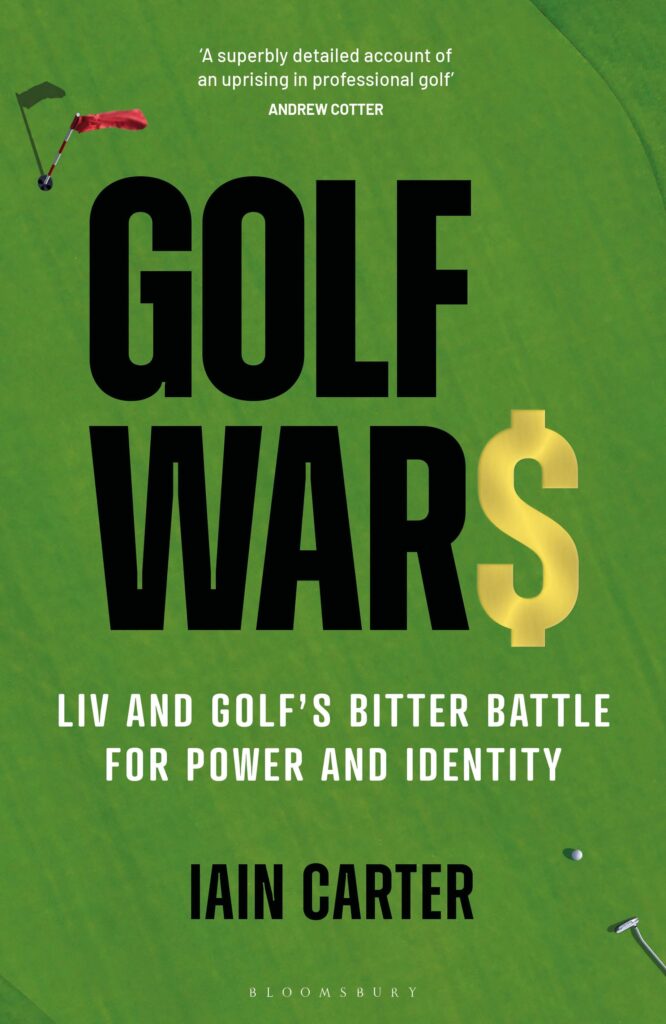The battle for the future of professional golf has been blazing. The Saudi-backed organisation LIV Golf has struck at the very heart of the golfing establishment, setting up rival tournaments with enormous prize pots and pitting the game’s most famous players against each other.
Led by legend Greg Norman, it has enticed the likes of Sergio García, Ian Poulter, Lee Westwood and Jon Rahm, parking its tanks on the manicured greens of the traditional game. Its tagline: Golf but louder.
With LIV now in its season and little sign of the struggle abating, BBC Golf Correspondent Iain Carter delivers the fascinating – and ongoing –account of a sporting upheaval.

Golf Wars spotlights the key players, both on the course and in the boardroom, exploring how the PGA Tour and other traditional organisations are fighting back. Carter covers every twist and turn, hearing from influential figures including Rory McIlroy, Jay Monahan, Greg Norman, Keith Pelley and Tiger Woods.
Through expert and up-to-date analysis of all sides of this bitter conflict, Carter reveals how the saga is unfolding and what it means for golf’s future. Has the controversial Saudi Arabian state essentially bought the game? Is LIV just a sport washing series of glitzy exhibition tournaments? Or is it a welcome challenge to the golfing hegemony and a long-awaited refresh of tired traditions?
This epic tale of fierce internal warfare has shaken golf to its core and marks a seminal moment in sporting history.
The following extract is included with thanks to Bloomsbury Sport
Saudi Arabia rejects such accusations, portraying itself as a dynamic, developing country that is becoming increasingly ready to thrive when oil revenues eventually run out.
Having attracted some of the biggest names in football, Cristiano Ronaldo included, it appears the most likely venue to stage the 2034 men’s World Cup. The Kingdom has its eye on tennis and signed a significant deal with Rafael Nadal in early 2024.
It is increasingly influential in Formula One and boxing. It could be argued that Crown Prince Mohammed bin Salman has become the most influential figure in world sport. But his investment fund stretches far and wide.
It has significant stakes in many global brands, the likes of Uber, Live Nation Entertainment, Meta, Starbucks, PayPal, Microsoft and Costco. Who are golfers to refuse the benefits from the riches of this almost bottomless pit of money
And as Andy Gardiner identified two decades earlier, golf was ripe for change. It was stuck in its ways. Away from its prestige events – the majors and Ryder Cup – it needed to start behaving like other sports. Players should not be allowed to pick and choose where they play; instead they should go where their tours – their employers – tell them, if they want the wages they feel they deserve.
Greg Norman had a similar vision in the 1990s – he called it ‘free agency’, which is ironic because when he finally was able to recruit top names they had to sign up to play all of LIV’s tournaments as well as Asian Tour events such as the Saudi Invitational.
A combination of Norman’s and Gardiner’s ideas and McIlroy’s ‘dream scenario’ seem to offer a future blueprint for the men’s professional sport. Who knows, the women’s game may also benefit in the future and maybe Saudi funding will result in a narrowing of what has become an increasingly wide gender pay gap.
Certainly, administrators have plenty on their plate as Guy Kinnings takes over from the departing Keith Pelley as boss at the DP World Tour. The R&A also began a search for a replacement for chief executive Martin Slumbers, who leaves at the end of 2024. Pelley and Slumbers both played important roles in the years of upheaval that coincided with LIV’s arrival.
Professional golf has always been open to slow and deliberate evolution. But it became increasingly vulnerable to revolution. So much of the rhetoric of the last couple of years has carried militaristic connotations despite the absence of physical victims. Some might say the biggest casualties were reputations and character as the greed of this oil-driven gold rush swept through during the period of the golf wars. Others will maintain that such collateral damage is an acceptable inevitability.
What is beyond question is that long-standing and historic bodies such as the PGA and DP World Tours have been changed forever because of golf ’s greedy and bitter infighting. To what extent it is altered is the final battleground.
Golf Wars by Iain Carter published 11th April.
Hardback RRP £20 (Bloomsbury Sport) Also available in Ebook and audiobook.

Iain Carter has been the BBC’s Golf Correspondent for 21 years, leading commentary teams for BBC Radio 5 Live at major championships and Ryder Cups and travelling the golfing globe to provide reports from all of the game’s most important tournaments. He will cover his 90th Major in 2024 and is a regular special guest on the BBC’s Chipping Forecast podcast #iaincartergolf

